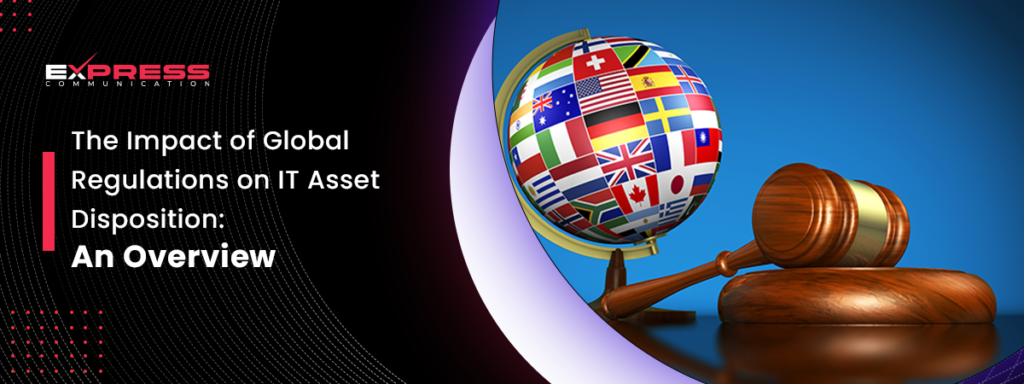
Have you ever wondered what happens to old computers, phones, and other IT equipment once businesses are done with them? This process is called IT Asset Disposition (ITAD), and businesses must manage it correctly. But there’s a twist – various global regulations significantly impact how businesses handle ITAD. Let’s explore how these rules shape the way companies dispose of their IT assets.
Table of Contents
What is IT Asset Disposition (ITAD)?
IT Asset Disposition, often shortened to ITAD, involves the processes used to retire, recycle, or dispose of IT equipment in a safe, secure, and environmentally friendly manner. Companies can’t just throw away old computers and servers because these devices can contain sensitive data and hazardous materials. Proper ITAD ensures data security, compliance with environmental laws, and recycling of valuable materials.
The Role of Global Regulations
Global regulations play a big role in how businesses handle ITAD. Different countries have various rules and standards to ensure that companies dispose of their IT assets properly. These regulations are designed to protect the environment, ensure data security, and reduce electronic waste. Let’s break down how these regulations impact businesses.
Data Security Regulations
One of the biggest concerns with ITAD is data security. When businesses get rid of old computers and servers, they need to ensure that no sensitive data is left behind. Various laws and regulations around the world mandate secure data destruction.
GDPR (General Data Protection Regulation)
In Europe, the GDPR sets strict rules on data protection and privacy. Businesses must ensure that all personal data is completely erased from IT equipment before disposal. Failing to do so can result in hefty fines and legal trouble. This means businesses need to use data destruction methods to comply with GDPR.
CCPA (California Consumer Privacy Act)
In the United States, the CCPA is another important regulation that impacts ITAD. Similar to the GDPR, it requires businesses to protect consumer data. When disposing of IT assets, companies must ensure that all personal information is securely erased to comply with CCPA requirements.
Environmental Regulations
Another crucial aspect of ITAD is its impact on the environment. Improper disposal of electronic waste (e-waste) can lead to pollution and health hazards. To prevent this, many countries have strict environmental regulations.
WEEE Directive (Waste Electrical and Electronic Equipment)
The WEEE Directive in the European Union sets standards for the recycling and disposal of e-waste. It requires manufacturers and businesses to take responsibility for the entire lifecycle of their IT equipment, including end-of-life disposal. This means businesses must partner with recycling companies to ensure compliance.
R2 and e-Stewards Certifications
In the United States, R2 (Responsible Management and Recycling) and e-Stewards certifications are two important standards for ITAD. These certifications ensure that recycling companies follow best practices for environmental and data security. Businesses often work with recyclers to meet regulatory requirements and demonstrate their commitment to sustainability.
Economic Impact of ITAD Regulations
Complying with global regulations for ITAD can be costly, but it also presents opportunities for businesses. Investing in proper ITAD processes can lead to cost savings in the long run, as well as improved reputation and customer trust.
Cost of Non-Compliance
Failing to comply with ITAD regulations can result in significant financial penalties. For example, GDPR fines can reach up to 4% of a company’s annual global turnover or €20 million, whichever is higher. Similarly, non-compliance with environmental regulations can lead to fines and legal actions. These costs far outweigh the investment in compliant ITAD processes.
Opportunities for Value Recovery
On the positive side, proper ITAD can help businesses recover value from their old IT equipment. By refurbishing and reselling old devices, companies can recoup some of their investment. Additionally, recycling valuable materials like gold, silver, and copper from electronic waste can generate revenue. These opportunities can offset the costs of complying with ITAD regulations.
Challenges in Global ITAD Compliance
While the benefits of ITAD compliance are clear, businesses often face challenges in navigating the complex landscape of global regulations. Here are some common challenges and how companies can address them.
Keeping Up with Changing Regulations
ITAD regulations are constantly evolving. New laws are introduced, and existing ones are updated to address emerging issues. Staying up-to-date with these changes can be challenging for businesses, especially those operating in multiple countries.
Solution: Partnering with ITAD service providers who are experts in global regulations can help businesses stay compliant. These providers keep track of regulatory changes and ensure that ITAD processes meet the latest standards.
Ensuring Secure Data Destruction
Data breaches are a significant risk during the ITAD process. Businesses must ensure that all data is securely erased from devices to prevent unauthorized access.
Solution: Using data destruction methods and working with ITAD providers who offer secure data erasure services can mitigate this risk. Businesses should also implement strict internal policies for data handling during the ITAD process.
Managing E-Waste
Properly managing e-waste is another challenge. Businesses need to ensure that their old IT equipment is recycled in an environmentally friendly manner.
Solution: Partnering with trusted e-waste recyclers who follow best practices for environmental sustainability can help businesses manage e-waste effectively. These recyclers ensure that hazardous materials are safely disposed of and valuable materials are recovered.
Conclusion
In conclusion, global regulations have a significant impact on IT Asset Disposition. These regulations ensure data security, protect the environment and provide economic opportunities for businesses. While navigating the complex landscape of ITAD regulations can be challenging, partnering with expert ITAD service providers and staying up-to-date with regulatory changes can help businesses stay compliant and reap the benefits of proper ITAD practices. As technology and regulations continue to evolve, businesses must remain proactive in adapting their ITAD strategies to meet new challenges and opportunities.




